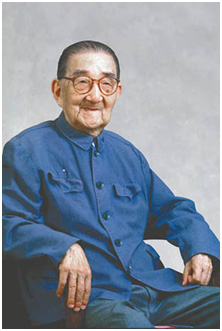Home> Awards
About Shizhang Bei
Updated: 2018-11-16

Shizhang Bei
Shizhang Bei, who was born on Oct 10, 1903 and died on Oct 29, 2009, was an experimental and cell biologist, and a famous educator in China. He is one of the pioneers of Chinese cytology, embryology and the founder of China's biophysics. In the early years of his academic career, he began research on experimental embryology and cytology of invertebrates and made in-depth studies on the relationship between the animals with cell constancy and regeneration. At the beginning of the 1930s, he discovered the intersexual fairy shrimp (Chirocephalus nankinensis) and observed the phenomenon of the mutual transformation of its male and female germ cells. In the 1970s he put forward the theory of cell reformation. He attached importance to the cross-discipline areas and was devoted to the development of China’s biophysics. He developed the branches and technologies of radiation biology, cosmobiology, bionics, biological engineering, and biological control, and cultivated a group of biophysicists.
He was born into a family of fishermen in Zhenhai county, Zhejiang province. He went to school at the age of 12 with his father, who was an employee in a company owned by a German merchant. He studied first at the Dehua School in Hankou, Hubei province and then received middle school courses at the Tongji Medical and Technical College in Shanghai. In 1921, Shizhang Bei finished the premedical course at the College and furthered his study in Germany’s Albert-Ludwigs-Universität Freiburg, the University of Munich and the University of Tübingen. He graduated from the University of Tübingen with a doctoral degree of natural sciences in March 1928. He served as an assistant in the University of Tübingen and did research under the guidance of noted experimental biologist J. W. Harms after graduation. Shizhang Bei returned to China in the autumn of 1929. During his stay in Germany, Shizhang Bei was surrounded by Germany’s traditions and rigorous attitudes in life and research, which had great influence on his academic career. In April 1930, Shizhang Bei took part in the establishment of the Department of Biology at Zhejiang University in Hangzhou. In August, he was hired as an associate professor there. He himself offered many courses such as histology, embryology, invertebrate biology, comparative anatomy, and genetics due to the lack of teachers. Besides lectures, he also insisted on scientific research even though the conditions of life and work deteriorated when Zhejiang University moved to Guizhou during the anti-Japan war period (1937-1945). He served as an associate professor, professor, department head, and dean of the College of Science, cultivating many students and promoting China’s biophysics during his 20 years at Zhejiang University.
Shizhang Bei travelled tirelessly for the establishment of the China Academy of Sciences after 1949. In 1950, he left Zhejiang University and worked as a professor and head of the Institute of Experimental Biology, Chinese Academy of Sciences in Shanghai. In order to participate in the work of CAS’s academic secretariat, Shizhang Bei moved his laboratory in 1954 and launched the Institute of Experimental Biology of Shizhang Bei and served as its head and one of its professors in 1957. The next year, the institute was named the Institute of Biophysics and Shizhang Bei served as a professor and director there. In 1983, he stepped down from his position as a director but continued as honorary director.
Shizhang Bei was meticulous in teaching and research and had many part-time academic jobs. After 1958, he served as the director of the Department of Biophysics at the University of Science and Technology of China; from 1978 to 1982, he was director of the Biology Teaching Department of USTC’s graduate school; from 1978 to 1984, he was chairman of the China Zoological Society; and he served as the chairman of the Biophysical Society of China from 1980 to 1983 and its honorary chairman from 1983 to 1986. Shizhang Bei acted as a member of the editorial board and an associate editor of Science China from 1958 to1983. He was the director of the editorial board of the Encyclopedia of China (Biology) after 1980 and deputy director of its general editorial board after 1984.
Shizhang Bei spared no effort in his assigned tasks, such as making short and long-term plans for the Science and Technology Planning Commission of the State Council and CAS, especially the 12-Year Program for the Development of Science and Technology in 1956, the suggestion on “Basic Construction of Science and Technology” in 1973, and the 8-Year Planning for Science in 1977. The publication of Cell Reformation (II), an academic paper collection, was the biggest wish for his 100th birthday on Oct 10, 2003. He had worked on it for over a year and the collection was published in September of that year.
Due to his outstanding achievements in science, Shizhang Bei was elected as an academician of the Academia Sinica and was invited as a professor at the Holland International Embryology Institute in 1948, where he was elected a committee member in 1949. In 1995, he was employed as a committee member of CAS’s Division of Biological Sciences. Shizhang Bei had visited the Soviet Union, Britain, Sweden, Canada, the United States, France, Italy, Austria, Czech, Hungary, Nepal, Pakistan, and Vietnam for academic exchange. He led a delegation of Chinese scientists to the US in 1972, after Sino-US relations had had been stalemated for more than 20 years.
Shizhang Bei made great contributions to China’s scientific cause in his nearly 70 years of scientific research and teaching.
